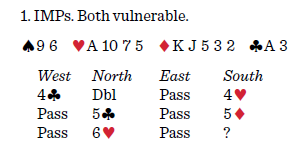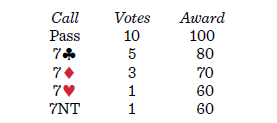
What’s your call?
| 6♠ | 6NT | |||
| 7♣ | 7♦ | 7♥ | 7♠ | 7NT |
| Dbl | Pass |
Ten panelists insist they haven’t shown their values and push on to a grand; the other half let the auction die in six.
The Coopers explain their pass: “The problem, obviously, is whether partner is looking for a grand or looking for a diamond cuebid to bid six. We think that if he wanted to unambiguously look for a grand, he should have bid something else. We think that when the enemy has stolen all of our room, we need to be supercautious about bidding a grand. Our teammates have not proven to be very understanding when they are minus 680 and we are minus 100.”
Cohen passes. “Who is to say partner doesn’t hold:
♠K Q J 10 ♥K Q J x x ♦A Q x x ♣—?
I do have some undisclosed extras, but the cardinal rule of team scoring is not to bid seven on these guess situa-tions. If your counterparts at the other table stop in game, you may already be ahead. Also, partner didn’t control bid 5♠, which he should have done if he was interested in seven.”
The Sutherlins comment, “Yes, we have extras, which we showed. But do we have extra extras? Let’s take the sure plus.”
Pass by Robinson. “Partner could easily have:
♠A Q J x ♥ K Q J x x ♦A Q x x ♣—
or
♠A K Q x x ♥K J x x ♦A Q x x ♣—
When he jumped to slam, there’s a chance that he’s gambling.”
Weinstein passes. “Because partner didn’t make a grand slam try, it sounds like he is telling us he did well to bid over 4♥ . Once we assume partner has a club void (no Blackwood), we have only two important cards for slam. If partner has a hand where we make seven, he wouldn’t have bid six.”
Boehm, Kennedy, Meyers, Sanborn and the Joyces use 7 ♣ to ask partner to select a red-suit grand.
Boehm asks, “How can partner hold fewer crucial cards than the ♠A, ♥ K, ♦A Q and substantial extra values including some sort of diamond fit since my 5♦ improved his hand? 7♦ might be the safest grand if partner has a hole in hearts but terrific spades to generate a heart discard.”
Kennedy: “I’m offering a choice between 7♦ or 7♥, suggesting that my hearts are not solid.”
Falk, Hampson and Robinson try 4NT in an effort to locate a diamond fit.
The Joyces: “We think we have enough top cards to complement partner’s bidding, and 7♣ should say, ‘Pick between the red suits.’”
Although he says he hates to do it, Colchamiro bids 7♦. “I have so much more than partner has a right to expect. My hidden jewel is the doubleton spade, which should match up nicely against:
♠ A K x ♥K Q x x x ♦A Q x x x ♣—.
Can partner really have less for his club cue and jump to 6♥ ?”
Three experts propose 7♦ as a grand alternative.
Rigal is one of them. “It is hard to believe that if partner can jump to the small slam I cannot make the grand slam. I might do this even without the ♣A (but I wouldn’t). 7♦ offers the choice of slams.”
Walker is hedging her bets, “just in case partner is missing a low heart honor or two. It’s unlikely, as he must have the rest of the deck, outside clubs, to be bidding like this. I’d be worried I was missing 7NT.”
Falk opts for 7♥. “Even if partner has an extreme hand that he might (and should) have bid differently — say,
♠ A K Q 10 x x x ♥K Q J x x ♦A ♣—,
where he hopes I have five hearts — he can hardly have played me for the trump ace to bid 6♥. Whatever he needs for a grand, I’ve got it. At matchpoints, I’d consider 7NT, but there’s no point at IMPs — just in case partner has:
♠A K Q x x x x x ♥K Q J x x ♦— ♣—.”
7NT by Lawrence. “Given what I have and what I might have for my auction so far, this should be a claimer.”

